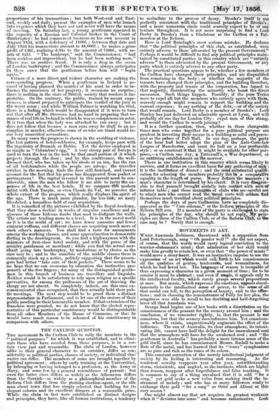THE CARLTON QUESTION.
THE movement hi the Carlton Club to rally the members to the ".political purposes" for which it was established, and to elimi- nate those who have seceded from those purposes, is in a cer- tain view just and reasonable. The clubs of London, however alike in their general character to an outsider, differ as 0°117 aiderably as political parties, classes of society, or individiiill cha= meter can differ. The members of some are brought together by political agreement ; otheis by early training at the Universities, by belonging or having belonged to a profession, as the Army or Navy, and some few by a general resemblance of pursuit : but even the latter class differs as widely as the Athenaeum differs from the Garrick—as widely as a philosophical member of the Reform Club differs from the pushing election-agent, or the idle man about town that has simply selected that building for its elegant saloons and its excellent dinners at a reasonable price. While the clubs in fact were established on distinct designs and principles, they have, like all human institutions, a tendency
to assimilate in the process of decay. Brooks's itself is not perfectly consistent with the traditional principles of Brooks's ; and a more numerous circle could scarcely expect to be of one texture throughout. It is not more surprising to find a Lord Derby in Brooks's than a Gladstone at the Carlton or a Pal- merston at the Reform.
Here is Lord Ranelagh's most serious mistake. He declares that " the political principles of this club, as established, were entirely adverse to those advocated by the present Government." Perhaps it would be difficult to find any political principles main- tained by constituted parties in this country which are entirely- adverse " to those advocated by'the present Government, or any party which is entirely adverse to any other party.
The practical questions appear to be, whether a few members of the Carlton have changed their priaciples, and are disqualified from remaining in the body ; or whether the majority of the tenants have changed their principles, and the building therefore, with the property and tenure of the corporation, has lapsed to that majority, disinheriting the minority who boast the direct succession. Such things happen. Possibly, if the pure Tories were to expel all but the members who entirely agree with them, scarcely-enough might remain to support the building and the current expenses; to say nothing. of the' debt,—or of the society that would remain. Lord Derby is a member of Brooks's ; Lord Stanley has just delivered an admirable speech at Lynn, and will probably sit one day for London City: expel men of this stamp, and would the Carlton be worth joining?
It is a further question, then, whether in these changeable times men who come together for a' pure political purpose are prudent in investing their means in a building so solid and peren- nial as the palace of Pall Mall. In our day, perhaps, the party of the hour had better adopt the plan of the Anti-Corn-law League of Manchester, - and erect its hall on a less perdurable style ; or so construct it that it might he available for other pur- poses,—a Carlton one day, a Tattersall's, a War department, or an outfitting establishment on the morrow.
There is one institution in this country which seems likely to survive, and it forms an excellent basis for any gathering of men : it is the institution of dinner ; and the most substantial qualifi- cation for selecting the members probably lies in a comparative equality in the length of purse. Money defines the manners ; a man's character is determined by his claret. It is very disagree- able to find yourself brought socially into contact with men of inferior table ; and those managers of clubs who are careful not to admit men who cannot read the usual carte will seldom find themselves much troubled about political principles.
Perhaps the days of pure Carltonism have as completely dis- appeared as the " Care oolonne," or the Reform principles of the Reform Bill sera. If a member of the party is challenged to state his principles of the day, why should he not reply, My prin- ciples are those of the Carlton Club, or of the Reform Club, as the case may be ? Surely that is enough.


























 Previous page
Previous page